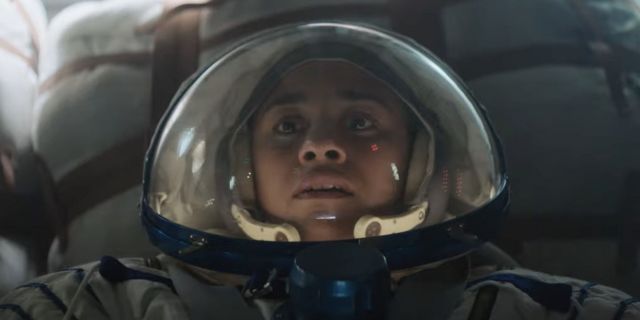Setting a tense thriller in space automatically multiplies the intensity by several significant increments. While it’s anything but easy from a set design standpoint, any story can become a tense fight for survival in a cold, dark vacuum. I.S.S. demonstrates that truth as a claustrophobic, efficient, and occasionally haunting thriller that only partially lives up to its stellar premise.
Director Gabriela Cowperthwaite is better known for her documentaries than her feature-length fiction. Her wildly influential 2013 film Blackfish earned universal acclaim. I.S.S. is an outlier in her career, which has primarily focused on heartrending true stories. Cowperthwaite directs from Nick Shafir’s black-listed script, marking his feature debut. As his first project, I.S.S. could mark a promising start for Shafir.
I.S.S. is refreshing in several ways. It does exactly what it says on the tin, conferring a blessing and a curse. The film’s impressively high-concept premise will be its main draw. A new astronaut, Dr. Kira Foster, reaches the International Space Station for her first off-world trip. Kira joins fellow Americans Christian and Gordon and Russian cosmonauts Nicholai, Weronika, and Alexey. They share a tiny space in which they must live, eat, sleep, work, and socialize. They all get along well enough despite the language barrier. While they’re enjoying each other’s company, Kira glances out the window and watches the first of many nuclear bombs detonate on the Earth’s surface below. The astronauts watch in horror as World War III breaks out beneath them, then both groups receive messages from their respective governments. The astronauts and cosmonauts now live under orders to seize the I.S.S. by any means necessary. That’s a spectacular premise, forcing the characters and audience to grapple with the shifting motivations of a group in the most hostile possible environment, wondering how far they’re prepared to take their duty.

All the problems with I.S.S. are of the “what might have been” variety. Almost every element that made it to the screen is serviceable and, in some cases, excellent. It does, however, feel like it could be considerably better. Efficiency feels like the order of the day, playing things safe rather than digging into the stellar premise. The set design is immaculate, capturing the lived-in feel of the claustrophobic area. Though the geography of the titular space station is inconsistent at best, it manages to remain visually entertaining for the entire runtime. Its decent sound design and Nick Remy Matthews’ cinematography fill in any gaps. These elements could have sunk the project. If the audience must be stuck with the characters in a claustrophobic capsule, it needs to remain compelling. The CGI is a mixed bag but typically passes without a trace. The occasional shots of Earth, as the pale blue dot undergoes a Mad Max prequel in real-time, is a brutally brilliant visual. These successes should sell the film, but there’s more to love.
The tiny cast carries the film’s quiet moments. Shafir’s script could have fallen flat if left in the wrong hands, but the six performers rise to the challenge. Ariana DeBose, best known for her award-winning performance in Spielberg’s 2021 West Side Story, leads the group as Kira. She’s sympathetic, charming, and headstrong, generally better in solemn scenes than when telling her life story. Chris Messina, Danny from The Mindy Project, brings a natural likability to Gordon. John Gallagher Jr., of 10 Cloverfield Lane fame, delivers a layered performance as Christian that slips into enjoyably sinister notes. On the Russian side, Maria Mashkova finds fascinating depth in Weronika, who carries a notable subplot. Costa Ronin, best known as Oleg in The Americans, delivers a gripping push-pull in Nicholai’s heady mix of duty and decency. Finally, Pilou Asbæk, the star behind Game of Thrones‘ Euron Greyjoy, imbues Alexey with all-consuming conflict, making him the most varied character on the station. It’s an excellent cast that keeps the film engaging, routinely elevating the script with painfully grounded creative choices.
While I.S.S. does several things well, it underdelivers on its stellar premise. The straightforward concept opened a world of potential Hitchcock-level thrillers that sadly don’t include this one. I.S.S. could have been the politically charged, scientifically grounded, modern answer to The Thing. One can imagine the complex emotional puzzle of a group of astronauts tussling with the elephant in the room. The internal struggle could have been the focus of the film. Instead, the film invents a ticking clock to put every life on the line and an altruistic goal that could help the struggling people on Earth. There is, again, a clever trick to that reveal, but it doesn’t amount to anything. This could have been a cruel psychological horror film pitting the will to survive against the shock of finding enemies. I.S.S. has something to say about sectarianism, but it isn’t willing to dig deep enough to get everything it could have out of its elevator pitch. As it stands, I.S.S. finds flashes of its brilliance in a concept that something like Black Mirror or The Twilight Zone could have turned into a classic.

If I.S.S. kicks open a door for smart, sleek, contained, high-concept thrillers to retake the big screen, it’ll be one of the most heroic outings in modern cinema. It’s not likely to have that significant an impact, but it could ignite that desire in a hungry audience. I.S.S. doesn’t capitalize on its mystery, political themes, or survival elements. By the end of the second act, it becomes a somewhat generic thriller. However, its killer premise, excellent set design, and gripping cast keep it well worth watching. The trip to the I.S.S. isn’t as great as it could be, but it is still worth the ride.











Leave a Reply